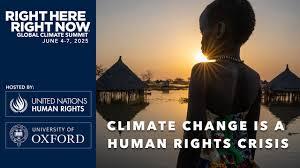
https://www.righthererightnow.global/
Right Here, Right Now Global Climate Alliance (RHRN) is a multi-stakeholder movement driven by universities and youth, to help the world align climate action with human rights obligations. According to the Intergovernmental Panel on Climate Change (IPCC), this rights-based climate action will enhance outcomes and their sustainability, reduce trade-offs, support transformative change and advance climate resilient development. By reframing climate change as the fundamental human rights crisis that leading scientists and human rights advocates, including the United Nations High Commissioner for Human Rights have declared it to be, RHRN promotes human rights as a powerful tool to help address the climate crisis.
Since Right Here, Right Now was launched at the UN Climate Change Conference in Glasgow Scotland (COP26) by United Nations Human Rights and supporters that included Leonardo DiCaprio, Quincy Jones and Camila Cabello, Right Here, Right Now has emerged as the largest public/private climate partnerships in the world.
This global movement works with governments, policy-makers, persons affected by climate change, NGOs, foundations, businesses, academics, scientists, technologists, and influencers that include celebrities, athletes, and artists, to fight climate change to preserve our common future.
Climate Change is a Human Rights Crisis
Right Here, Right Now humanizes the climate crisis by reframing it as the fundamental human rights crisis it is, as women, children, minorities, the poor and marginalized will continue to suffer the most as the climate catastrophe escalates.
Right Here, Right Now, its global partner United Nations Human Rights, and academic partner the University of Oxford, are committed to promoting, protecting, and advancing the rights of people around the world suffering from the devastating effects of climate change, starting with persons and communities already in disadvantageous situations owing to geography, poverty, gender, age, disability, cultural or ethnic background, among others, that have historically contributed the least to greenhouse gas emissions.
The 2023 Assessment Report by the Intergovernmental Panel on Climate Change (IPCC) states: Actions that prioritize equity, climate justice, social justice and inclusion lead to more sustainable outcomes, co-benefits, reduce trade-offs, support transformative change and advance climate resilient development. Adaptation responses are immediately needed to reduce rising climate risks, especially for the most vulnerable. Equity, inclusion and just transitions are key to progress on adaptation and deeper societal ambitions for accelerated mitigation.









